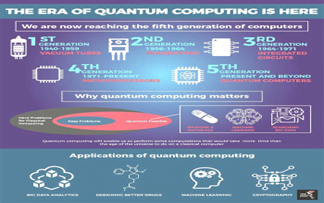Science and Technology
Context: Recently, a draft research paper claimed Google researchers have achieved a long sought- after goal in physics called “quantum supremacy”. But a team from IBM has published their own paper claiming they can reproduce the Google result on existing supercomputers.
About Quantum Supremacy:
- The phrase “quantum supremacy” was coined in 2011 by John Preskill, Professor of Theoretical Physics at the California Institute of Technology in a talk he delivered on the benefits of using quantum hardware over traditional computers.
- Quantum computing is the use of quantum-mechanical phenomena such as superposition and entanglement to perform computation.
- A quantum computer is used to perform such computation, which can be implemented theoretically or physically.
- Quantum supremacy refers to a quantum computer solving a problem that cannot be expected of a classical computer in a normal lifetime.
- This relates to the speed at which a quantum computer preforms.
- Quantum supremacy is the point at which quantum computers can solve problems that are practically unsolvable for “classical” (nonquantum) computers to complete in any reasonable timeframe.
- In principle, even the simplest universal computer can solve anything that is computable given infinite time to do so.
- It is generally believed that at least 49 qubits are required to cross the quantum supremacy line.
- Qubits behave very differently to bits in classical computers.
- Bits represent either a “1” or a “0,” and computers read and perform operations on one bit at a time.
- In contrast, qubits can represent a combination state made up of both “1” and “0,” due to the peculiar quantum effects in which properties like particle position, direction, and momentum are not well-defined.
- This allows for a system to be in multiple states at the same time, called quantum indeterminacy.
Application of Quantum Computing:
- Artificial Intelligence (AI): Quantum computers could empower machine learning by enabling AI programs to search through these gigantic datasets concerning medical research, consumer behavior, financial markets, etc—and make sense of them.
- Computational Chemistry: Today’s digital computers can analyze only the simplest molecules. But quantum computers can do precision modelling of complex molecular interactions and also find the optimum configurations for chemical reactions.
- Google has already made inroads in this field by simulating the energy of hydrogen molecules.
- The implication of this is – more efficient products, from solar cells to pharmaceutical drugs, and particularly fertilizer production; since fertilizer accounts for 2 percent of global energy usage, the consequences for energy and the environment would be profound.
- Financial services: Quantum computers can be used for complex financial modelling and risk management in the financial industry by finding new ways to model financial data and isolating key global risk factors.
- Cryptography: Online security depends on the factoring large numbers into primes which can be done by digital computers themselves, however, it would consume an immense amount of time that makes “cracking the code” expensive and impractical.
- Quantum computers can perform such factoring more efficiently than digital computers = Quantum computing can soon replace those obsolete methods.
- Weather Forecasting: The ability to better predict the weather would have enormous benefits to many fields, not to mention more time to take cover from disasters.
- Conventional computers would take longer than it takes for the actual weather to evolve. Equations governing the weather possess a hidden wave nature which can be analysed by quantum computers = better weather prediction.
- Climate modelling: Quantum computers could help build better climate models that could give us more insight into how humans are influencing the environment.
- Particle Physics Simulation: Models of particle physics are often extraordinarily complex which require vast amounts of computing time for numerical solution.
- This makes them ideal for quantum computation, and researchers have already taken advantage of this.
- Logistics and Scheduling: Quantum computing can make significant strides in the logistics sector.
- Although classical computing is used heavily to do these tasks, some of them may be too complicated for a classical computing solution whereas a quantum approach may be able to do it.

Source: DownToEarth
Previous Year Question
Q.1) Which one of the following is the context in which the term “qubit” is mentioned? (2022)
- Cloud Services
- Quantum Computing
- Visible Light Communication Technologies
- Wireless Communication Technologies











